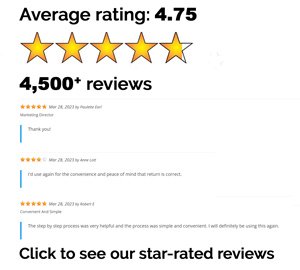The information in this article is up to date for tax year 2023 (returns filed in 2024).
Want to avoid owing a large amount of money at tax time? Make sure you take advantage of every tax deduction you can! We know that the tax laws are confusing and it can be hard for the average person to know what tax breaks are out there. Fortunately, we are willing to share our tax secrets.
Here are 6 tax deductions you may not know about.
1. Medical and dental expenses
Did you know that claiming your medical expenses could reduce your tax bill? That’s right! So, the next time you start dreading that trip to the doctor, just think of all the tax savings you’re racking up in the process.
If you itemize your deductions, you can deduct unreimbursed medical and dental expenses paid for you, your spouse and your dependents. Qualified expenses include payments for the diagnosis, treatment, or prevention of disease. The downside? You can only deduct the portion of the bill that exceeds 7.5% of your adjusted gross income (AGI).
2. Mortgage interest
Home ownership can be expensive, but it comes with tax benefits. This includes being able to deduct the interest paid on a loan used to buy, build or improve your main or second home.
How much interest you can deduct depends on when you bought your home. If your purchase was before December 15, 2017, you can deduct the interest on mortgages up to $1,000,000 ($500,000 if married filing separately). Those who purchased their home after that point can only deduct the interest on mortgages up to $750,000 ($375,000 if married filing separately).
3. Charitable contributions
A small amount can make a big difference when it comes to helping those less fortunate. But you may want to dig a little deeper into your wallet the next time you are asked to donate to charity.
If you itemize and give to a qualified organization, your charitable contributions may be tax deductible. Qualified organizations include nonprofit hospitals and colleges, Veterans’ groups, religious organizations, and more. For tax year 2023, you must itemize your deductions on a Schedule A to receive this tax deduction. You can make cash donations up to 60 percent of your adjusted gross income.
4. Student loan interest
Sick and tired of paying your student loans? Who isn’t?! It’s an extra bill we rack up every month that can be very expensive! Well, we have some news that will make the pill a little easier to swallow.
You can deduct the interest you’ve paid during the year or up to $2,500 for student loan interest, whichever is less. So paying off your student loan debt can actually pay off!
>>Learn more about how financial aid affects your taxes.
5. Self-employment deductions
Being your own boss is great for many reasons. You get to call the shots, set your own schedule, learn invaluable lessons, create job opportunities and more. But being self-employed can also be very costly, especially when it comes to your tax return. This is why it’s important to understand the self-employment deductions that you may qualify to lower your tax bill.
Deductible expenses include:
- Home office deduction: You can deduct $5 per square foot of your space, up to 300 square feet for a maximum deduction of $1,500.
- Work-related vehicle expenses: The standard mileage rate is 65.5 cents per mile for tax year 2023.
- Health insurance premiums: You can deduct medical, dental and long-term care insurance premiums for you, your spouse and your children who are under 27 years old at the end of the year.
- Office supplies: Any office supplies you use for business can be deducted from your tax bill. This includes computers, printers, internet hosting fees, cloud services, software, phones, paper, pens, etc.
- Self-employment taxes: The self-employment tax rate is 15.3% which breaks down to 12.4% for Social Security and 2.9% for Medicare. You can deduct half of it from your income when you file your federal tax return.
Keep good track of your business expenses throughout the year so you can take advantage of all available deductions at tax time.
6. State and local taxes (SALT deduction)
According to WalletHub, residents in New York, Hawaii and Maine have the highest tax burdens in the country. The good news is you can deduct your state and local taxes if you itemize.
You can include the amounts paid for real estate taxes, property taxes, and either income taxes or general sales taxes. You cannot deduct both. The maximum SALT deduction is $10,000 ($5,000 if married filing separately).
Not sure what deductions you qualify for? At ezTaxReturn.com, we offer FREE customer support to answer any questions you have. It’s fast and ez!
The articles and content published on this blog are provided for informational purposes only. The information presented is not intended to be, and should not be taken as, legal, financial, or professional advice. Readers are advised to seek appropriate professional guidance and conduct their own due diligence before making any decisions based on the information provided.




